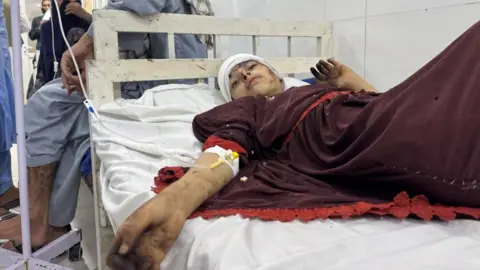More than 800 people have been killed - and nearly 3,000 injured - after a magnitude-six earthquake struck eastern Afghanistan just before midnight on Sunday, the United Nations' humanitarian agency has said.
Most of the deaths are in Kunar province, officials say, warning that the death toll may rise significantly as entire villages have been destroyed by the quake. The epicentre is in a remote mountainous area, making it difficult for rescue operations to be carried out. The scale of devastation is unimaginable, a Taliban official said.
The disaster comes as Afghanistan reels from a severe drought, aid cuts and what the World Food Programme describes as an unprecedented crisis of hunger. The earthquake hit at 23:47 (19:47 GMT) on Sunday, some 27km (17 miles) east of Jalalabad - the country's fifth-largest city, in eastern Nangarhar province.
Faridullah Fazli was fast asleep at home in Asadabad when the tremor jolted him awake. There was a very strong earthquake, accompanied by sounds that were very scary, he told the BBC. He assisted in the transport of the dead and injured to a hospital further south in Nangarhar province.
A resident of Mazar Dara reported that 95% of the village had been destroyed, with injuries affecting nearly every household. The worst damage was in Kunar, characterized by limited farmland and difficult roads. Rescue operations are hindered by blocked roads and the mountainous terrain. As a result, helicopters have become crucial for transporting aid and rescuers to affected areas.
Despite challenges, over 100 flights have been conducted to deliver aid in clear weather. A Taliban official in Kunar expressed concern over the loss of life beneath the rubble, stating, Most of the dead are under rubble. We are doing everything, but it doesn't seem possible soon.
Jalalabad's main hospital is overwhelmed with the influx of casualties, amid existing humanitarian strains due to international sanctions and aid cuts following the Taliban's rise to power. The international community is being urged to assist further in the humanitarian crisis that is intensifying as a result of the earthquake's impact.
Most of the deaths are in Kunar province, officials say, warning that the death toll may rise significantly as entire villages have been destroyed by the quake. The epicentre is in a remote mountainous area, making it difficult for rescue operations to be carried out. The scale of devastation is unimaginable, a Taliban official said.
The disaster comes as Afghanistan reels from a severe drought, aid cuts and what the World Food Programme describes as an unprecedented crisis of hunger. The earthquake hit at 23:47 (19:47 GMT) on Sunday, some 27km (17 miles) east of Jalalabad - the country's fifth-largest city, in eastern Nangarhar province.
Faridullah Fazli was fast asleep at home in Asadabad when the tremor jolted him awake. There was a very strong earthquake, accompanied by sounds that were very scary, he told the BBC. He assisted in the transport of the dead and injured to a hospital further south in Nangarhar province.
A resident of Mazar Dara reported that 95% of the village had been destroyed, with injuries affecting nearly every household. The worst damage was in Kunar, characterized by limited farmland and difficult roads. Rescue operations are hindered by blocked roads and the mountainous terrain. As a result, helicopters have become crucial for transporting aid and rescuers to affected areas.
Despite challenges, over 100 flights have been conducted to deliver aid in clear weather. A Taliban official in Kunar expressed concern over the loss of life beneath the rubble, stating, Most of the dead are under rubble. We are doing everything, but it doesn't seem possible soon.
Jalalabad's main hospital is overwhelmed with the influx of casualties, amid existing humanitarian strains due to international sanctions and aid cuts following the Taliban's rise to power. The international community is being urged to assist further in the humanitarian crisis that is intensifying as a result of the earthquake's impact.


















